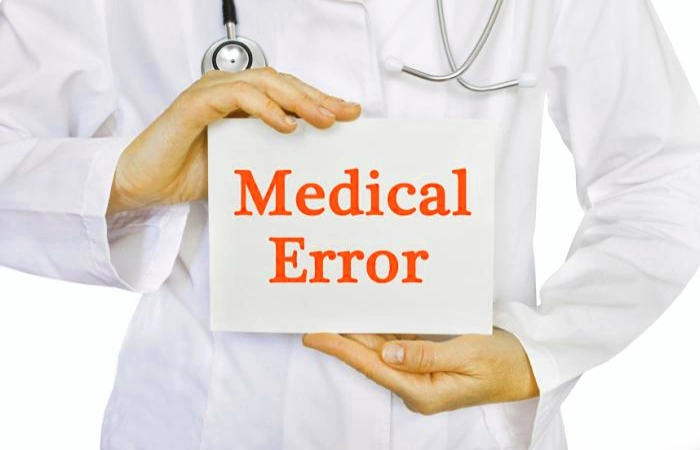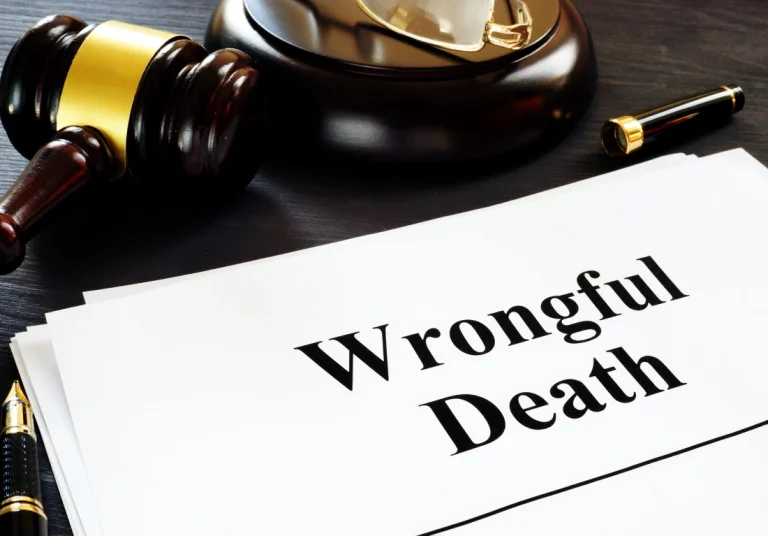Coming to terms with the loss of a loved one is difficult. This situation worsens when the family feels that their relative did not receive adequate medical care from their doctors and that medical malpractice might have led to their death. Generally, every medical professional – be it a doctor, nurse, pharmacist, or diagnostic staff owes a duty of care to their patient. Lawfully, when a medical professional violates this code, resulting in a patient’s death, it is known as wrongful death due to medical negligence. Pursuing a wrongful death claim compensates the surviving family for their suffering from losing a loved one.
This article will provide an overview of the legal claims procedure that usually follows wrongful death due to medical negligence. It will explore the circumstances surrounding medical negligence cases that lead to patient death. It will also discuss how the deceased person’s family can file a medical malpractice lawsuit, explain the limitations available for filing claims and describe the legal procedure involved in wrongful death claims due to medical malpractice.
What is wrongful death?
Wrongful death is a direct result of negligence, carelessness, unlawful act, or a lack of action of a medical practitioner. Wrongful death cases result from a variety of circumstances, including:
- Medical malpractice
- Nursing home abuse or negligence
- Birth injuries caused by negligence
- Defective medical devices
- Automobile accidents caused by negligence
- Assault
- Recalled or dangerous vehicles
- Dangerous or recalled food sold in grocery stores or restaurants
Losing a loved one can bring the added pressure of financial strain or have a significant psychological impact. If you believe that your loved one’s premature passing resulted from medical negligence, you may have a compensation claim. State law governs wrongful death lawsuits, and specific procedures are unique to wrongful death lawsuits. As such, you should seek the services of medical malpractice attorneys.
What is medical malpractice?
Medical malpractice is the negligent act of a medical provider that causes injury to a patient. It mainly occurs when a healthcare professional fails to provide appropriate treatment or provides a treatment that deviates from the established professional standard of care or omits to take appropriate action. Medical negligence frequently leads to patient fatalities. Medical malpractice fatalities account for at least 250,000 lives each year.

Medical malpractice law makes it possible for patients and their loved ones to recover compensation from any harm or death that results from substandard patient care.
Types of medical malpractice
Medical negligence can occur during any stage of the doctor and patient interaction, from consultation to post-operation. Some of the most common forms of medical malpractice include:
- Delayed hospital referral by a health professional on presentation of an acute condition such as heart attack, pulmonary embolism, or brain hemorrhage.
- Failure to diagnose: A competent doctor should be able to discover a patient’s illness after consultation and the necessary tests. Failure to follow a procedure can cause the doctor to miss the patient’s condition or make a different diagnosis leading to their death.
- Misdiagnosis: A doctor could misdiagnose a health condition or ailment, leading to inappropriate treatment or a delay in care that either fails to heal or worsens a patient’s health.
- Misinterpreting test results
- Surgical errors include incorrect surgery sites, unnecessary operations, or retained foreign objects after surgery.
- Premature discharge or lack of proper follow-up care.
- Incorrect medication or dosage: A pharmacist may give the patient the wrong medication causing them harm.
- Negligence during childbirth leads to stillbirth or death of the mother
The Definition of Negligence
It is essential to understand that medical practitioners cannot guarantee treatment results. Unforeseen results sometimes occur even when doctors treat their patients by the accepted standard of care. In such cases, victims of unfortunate deaths cannot sue for medical malpractice. To be able to file a medical malpractice case, the doctor must have:
- Established a professional relationship with the patient This proved that they owed them a duty of care.
- Breached their duty of care
- Caused the patient’s death by failing to provide adequate care.
- This caused significant damage to the patient and their family members.
If a doctor’s medical malpractice led to the death of a loved one, you might wish to seek wrongful death due to medical negligence compensation.
What is a wrongful death suit?
This law case allows the surviving family members to seek justice on behalf of a loved one who passed away due to medical negligence. Often, this claim can be made by a representative of the deceased Estate. However, not all deaths will qualify for a wrongful death lawsuit. The cases must meet specific criteria to qualify as wrongful death cases.
A medical malpractice attorney can help you prove medical malpractice and file a wrongful death lawsuit to seek the financial losses you suffered from your loved one’s death.
When Medical Malpractice Leads to Wrongful Death Lawsuit
Medical negligence refers to the breach of a qualified medical professional’s duty of care, resulting in someone sustaining further or avoidable harm. When a negligent act causes damage or death, an attorney can help you seek legal justice. Although medical malpractice and wrongful death claims are different in legal terms, there are a few things you need to know about when both concepts merge in a single case. Some issues are common to different types of wrongful death lawsuits. They include:
- Who can pursue a wrongful death claim and get compensation on behalf of the deceased person
- How can one get legally appointed to represent the deceased patient?
- What type of damages are acknowledged in a wrongful death case?
Who can claim wrongful death caused by medical negligence?
In wrongful death claims, certain parties have the right to claim compensation for the deceased. The person entitled to bring that claim will depend on whether the deceased left a will or not. If they left a will, the appointed executors could act on their behalf in death. However, the executors must get a Grant of Probate in the Estate, giving them legal standing to deal on behalf of the deceased.
If the deceased did not leave behind a will, the rules of Intestacy would come into play. This means that the deceased’s nearest relative will be able to use a Grant of Letters of Administration. This legal document gives them legal power over the deceased’s Estate. This can be the parents, child, or surviving spouse.
How does one legally get appointed to represent the deceased?
Whether the family unanimously agrees to choose one person as a representative or whether this is done after a court hearing, the state court in charge of Wills and Estate must appoint the deceased person’s representative. In most states, this court is known as the probate court.
The probate court requires the proposed representative to notify all interested parties in the case. If no one objects, the proposed representative will be appointed by the court as the Estate’s legal representative. However, if someone objects, the court will conduct a hearing to decide who will represent the deceased’s Estate.
Who can I make a claim against?
You can file a compensation claim for medical negligence against a doctor or healthcare provider that you believe acted negligently or whose actions led to your loved one’s death. Here is a list of healthcare professionals that you can sue and pursue a medical negligence claim:
- Surgeons
- Nurses
- Pharmacists
- Anesthetists
- General practitioners
- Medical consultants or specialists
Damages you can claim be in wrongful death cases
When making a wrongful death claim, there are some expenses, damages, and costs that you can try to recover. For instance, you can seek compensation for hospital negligence, a doctor’s negligence, or medical staff negligence. Each of these claims comprises both general and special damages. Each damage should compensate an amount equivalent to the impact of the wrongful death on the deceased’s family.

The damages you can claim in wrongful death lawsuits may differ from those commonly sought in medical negligence cases. Generally, medical malpractice damages include medical expenses, disability or disfigurement, lost wages, or punitive damages. In addition to these damages, in a wrongful death claim, the plaintiffs may also pursue:
- Dependency claims: This claim can be made by a child or spouse dependent on the loved one financially and for the time they gave to the household.
- Loss of financial support may include future losses and loss of pension: The care and assistance your loved one contributed to the family/household, like helping kids with their homework or doing the school run, mowing the lawn, doing housework, etc.
- Claim for suffering mental harm: This claim is made by a close relative of the deceased who can prove they suffered a psychiatric injury due to the unexpected death of a loved one.
- Pain and suffering: The court looks at the pain and suffering experienced by the deceased before they died.
- Travel expenses: This may include transportation costs incurred by the plaintiff for traveling between the hospital, the law office, and the victim’s home and all other trips they made about the case.
- Loss of guidance and nurturing: This applies in cases where the deceased had children.
- Loss of consortium: This includes the loss of companionship, love, and comfort to the spouse.
The types of damages acknowledged in wrongful death lawsuits due to negligence will depend on the proven facts of your case and applicable state laws. Contacting a wrongful death lawyer before filing a claim or seeking compensation is advisable.
How much compensation can one get for wrongful death caused by medical negligence?
Medical negligence that results in someone’s death can see compensation ranging from tens of millions to under a million. Unfortunately, there is no average, typical settlement amount in such cases. The amount of payment you could be entitled to will depend on the circumstances surrounding your loved one’s death. Other factors that determine the compensation and benefits of wrongful death arising from medical negligence include:
- The law you’re governed by
- The state you live in
- Whether the claim relates to a loss of dependency or psychiatric injury
How to Start a Wrongful Death Lawsuit Due to Medical Malpractice
When a close family member dies due to medical negligence, you might be curious about your legal rights regarding the ability to claim compensation. The lack of familiarity with the laws, regulations, and processes involved in such a claim can complicate this legal battle. If you feel you can take action, we recommend taking several steps to place any future wrongful death claim on a firm footing. The steps involved include:
- Seek a second or third medical opinion: To prove the claims of medical negligence of a doctor or any other medical practitioner, you must seek a second opinion to back up your claim.
- Organize, document, and file all the evidence you can find: Request medical records from the doctor or institution. These records will contain all the necessary information regarding the patient’s condition, treatments, and other details about their care. This includes notes, x-rays, lab results, emails, and any other information regarding the case.
- Gather all bills and receipts to estimate the financial loss caused by wrongful death: This may include medical bills, expenses incurred, and lost earnings. This evidence can be effective when determining how much compensation you can get for wrongful death due to medical malpractice.
Once you have all of these in order, the next important step is to seek legal counsel. A professional legal team will help you:
Establish a wrongful death lawsuit
Medical malpractice can lead to wrongful death or personal injury cases. In individual injury cases, the affected person can seek personal compensation themselves. But in wrongful death lawsuits, since the victim is deceased, they cannot represent themselves. In such a case, an estate representative or loved one can pursue financial compensation on their behalf.
Prove wrongful death
As with other medical malpractice claims, you need to prove that any act or omission by the medical practitioner’s or facility caused the wrongful death. Ultimately, proving wrongful death requires you to establish medical negligence.
You must prove that a medical practitioner such as a doctor, caregiver, pharmacist, or surgeon had an obligation to offer adequate care but failed to do so. You must also prove that their negligence led to your loved one’s death, leaving you with considerable damages. Only wrongful death lawsuits that meet these criteria qualify for financial compensation.
How to prove that wrongful death was due to medical negligence
To prove that medical negligence led to the death of a loved one, you must provide:
Proof that there was a formal doctor-patient relationship
You must prove that the deceased had a formal medic-patient relationship with the medical practitioner you are bringing a suit against. This means that the dead patient hired the medic, and the medic agreed to treat the patient. You cannot sue a medical practitioner you overheard advising another party.
The medical practitioner was negligent
Because treatment did not go as planned does not mean the doctor was negligent in their duties. You must prove that the doctor was negligent concerning the deceased diagnosis or treatment. You must verify, without doubt, that the doctor’s negligence caused harm to the patient that led to their death and that a qualified doctor could have achieved different results under the same circumstances.
The doctor’s negligence caused the death
Because most medical negligence cases involve patients who were already ailing or wounded, it is not uncommon for questions as to whether the patient’s death resulted from the doctor’s negligence or the patient’s illness. For instance, if the deceased suffered a heart attack and the doctor did something careless, it can be hard to prove that the patient’s death was due to medical malpractice and not heart failure. Hence, you must prove that the doctor’s negligence or wrongful act directly caused the death. Usually, this is possible if you have an independent medical expert testify that the medical practitioner’s negligence caused the death.
The wrongful death led to specific damages
Finally, you must prove that the premature death of your loved one led to a particular injury. Some damage you can sue for include loss of income, mental anguish, pain, and suffering.
Limitations in wrongful death lawsuits
Like most legal matters, you should know some limitations in wrongful death cases. For instance, different states have different time limits on how long a person is eligible to file a wrongful death case, also referred to as a statute of limitations for filing a wrongful death claim. In most states, the statute of limitations is two years from the date of death. Once this period has lapsed, you may be unable to take legal action.
Exceptions to these limitations apply depending on the different circumstances of a case. For instance, if the complainant lacks the mental capacity to claim on their behalf or if someone is under the age of
Also, different states have different laws that determine who can seek legal justice over a wrongful death. Most states allow certain family members to pursue legal action, while others require the decedent’s estate executor to file suit. An experienced wrongful death attorney provides you with all the necessary details on the legal process of a wrongful death lawsuit in your state.
There are also financial limits to what you can pursue in these cases. These limits often are specific to the type of damage sought, the type of lawsuit, and any limits established by state law. For example, Texas has a $250,000 damage cap for non-economic damages. These damages cannot be valued by financial records, such as pain and suffering, loss of companionship, emotional distress, or consortium.
How to get help with wrongful death cases
Losing a loved one is never easy. We hope our loved ones will live long, healthy, full lives. Unfortunately, this is not always the case. Suppose your family is suffering from the untimely and possibly preventable death of a loved one; it may be helpful to seek the advice and services of an attorney to determine if you are eligible to file a wrongful death lawsuit.

While you can opt to go solo on such a case, having legal representation is critical to guide you throughout the process. This will save you time, but it will also set you up for a successful case.
At Gregory Spektor & Associates, P.C., we understand how painful losing a loved one can be. Knowing that your loved one’s death resulted from medical malpractice can make the emotional trauma seem much worse.
Amid the grief and confusion of it all, it can be hard to understand your legal options. But, if you believe that medical negligence was the cause of your loved one’s death, you have every right to seek compensation. While we understand that this is not an easy decision to make, it is important that you know and understand your legal options.
Contact Gregory Spektor & Associated, P.C. today!
Gregory Spektor & Associates P.C. has an experienced team of medical negligence lawyers who will objectively review your case and help you understand the legal options available to you. We will listen to your case and review all the evidence provided to evaluate your case objectively. Our experienced and understanding medical negligence lawyers will provide tailored advice about your legal rights and help you access the compensation you deserve through each step of the claims process.
Our personal injury lawyer team is ready to offer free advice and legal representation during court proceedings if you desire. Our solicitors can estimate the compensation settlement if you have a strong case. They can even arrange a third-party medical opinion for an unbiased view of the case. Feel free to contact us today for a free, no-obligation legal consultation.






